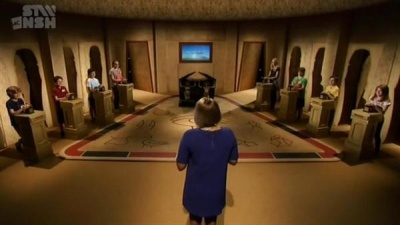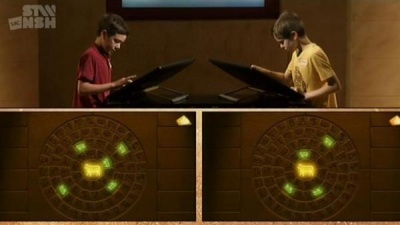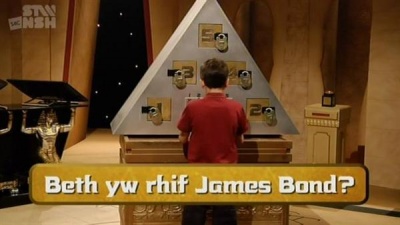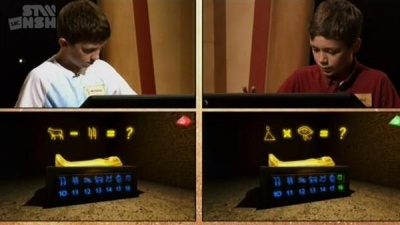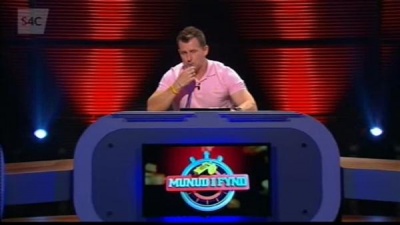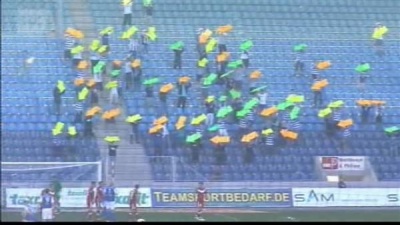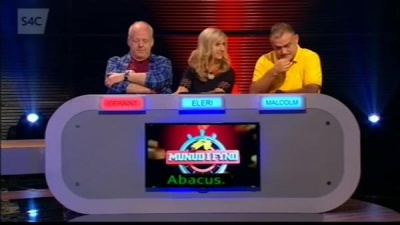Weaver's Week 2014-11-02
Last Week | Weaver's Week Index | Next Week
We're going back into Wales for this week's pair of reviews: a classic panel game, and some modern appalong entertainment.
Contents |
Pyramid
Boom Pictures for S4C, from 15 September
We had high hopes for the new show from Boom Pictures. They pioneered the appalong genre with Y Lifft (2012), and brought it to the English-speaking market in Ludus (2014). The new programme had arresting promo copy:
- The new adventure show, presented by Rhiain Temple, which takes the 21st Century to Ancient Egypt! Who will solve the Pyramid's puzzles and evade the traps before the sand hits the bottom of the hourglass? 8 will begin the game but only one will walk away with the Pyramid's treasures. Some levels will be quick-fire questions; some will be interactive touch-screen games while others will be physical challenges."
The show almost lives up to these expectations, but we fault it for promising more than it delivered.
Here's how it happens. Eight children enter, and the show begins with a quiz round. Whoever gives the most right answers steps back, and their lights go out. And then there's another quiz round. And, for variety, another quiz round, and another one.
Four rounds in total, the winners are the four children to make the next level. This sounds fine, but it's long and it's painful. If we wanted to watch quickfire questioning, we'd be watching Y Helwriaeth over on HTV. It's almost nine minutes – over a third of the programme – before the appalong games enter.
At last! In a couple of sample episodes, we've not seen much variety. One about finding an Egyptian hieroglyph (or guesting Greek letter) in a series of revolving concentric circles. Another was shooting missiles into coloured lights, avoiding beetles crossing the path. Another is about catching balls as they fall down an electronic Tipping Point machine. Or was it an inverted pyramid of pins? The trailers show another game, tracing a path across a Blockbusters board, but we've not seen this.
The players play these games at touchscreens. They're facing each other, with big displays between each other, and at a podium supported by little Egyptian figurines wearing headdresses. The rest of the set is decorated with stereotypes of ancient Egypt, and it's shot in a slightly washed out light. Looks good, but too many of the games don't feature a scoreboard on screen. We can't see who leads, or by how much.
Three survive to take on the Pyramid Challenge. One show had a number riddle indicates which of ten keys will open this lock, that revealed another number riddle. repeat five times. Another show asked the players to remove blocks from a wall without it collapsing. Each block had a number, and the highest total won.
These are the physical game. It's an actual pyramid, with actual physical padlocks and metal keys. It's an actual wooden wall, it will actually collapse in front of us. The winner progresses to the show's final.
Everyone else – the remaining seven from the original line-up – are back for one final quiz round. Could be true-or-false, could be picking the right answer from a board of possibles. Good to see the Departure Board round from Runway returning to its origins.
Winner of this quiz round takes on the Pyramid Challenge winner in the final game. Hieroglyphs (and guesting Greek letters) appear in place of numbers from 0 to 19. The code is shown on the base of a tomb and we can only see two of the four sides. Whoever touches the most right numbers wins. Best tactic might be to guess rather than work it out.
And that's it: the winner of the maths puzzle wins the prize of some high-tech gadgetry (and a chocolate fountain). Didn't go out of the studio, and didn't have much of the promised "adventure".
As we see it, the show has two problems. The quiz element goes on and on – around half of the programme is taken up with question and answers. Every second they're asking questions is a second they're not playing on the apps. The other problem is that split-screen head-to-head games don't work for a viewer. They were a weakness on 3-2-1 in 1981, and remain a problem so many years later.
The show has plenty of ideas, and no end of cute touches. But we don't get any story, players enter and leave for no tremendous reason, and the prize is almost an afterthought. Worst of all, the apps are used for four minutes in a half-hour show.
Munud i Fynd
Avanti for S4C, from 2012
Nigel Owens, a former rugby union ref, hosts a panel quiz.
Given Nigel's background, there's a sport motif running through the show. We can tell this from the stopwatch and whistle in the show's logos. We can tell this from the "yellow" and "red" cards he brandishes from time to time; a red card will force a player to shut up for a minute. That's a long time in a 23-minute show.
Munud i Fynd has been going for three series, and already the captains have changed. Iwan John and Elin Fflur left, replaced by Tudur Owen (comedian), and Eleri Siôn ("mischievous presenter", according to S4C). Malcolm Allen (footballer) and Dafydd Jones (rugbyman) are permanent panellists, with entertainers and comedians guesting for a single show.
The programme begins with "One Minute to Go", the titular buzzer round, one minute of rapid-fire questions on the buzzer. So far, so predictable. Then comes "A Question For Fun": a remarkable fact about one of the opposite team, but which one? Ask questions, and the opposition will all say that, yes, they have been banned from the Cardiff butterfly centre. Yes, we've seen the idea on Would I Lie to You?, but here it's one round amongst many, and doesn't outstay its welcome.
"Ruck or Roll" comes next, where the team decides between a sport question, and one about popular music. Recognise these tunes played at the wrong speed, or in the wrong direction. Or tell us, what happened next in this sporting clip? Then comes the half-time break, with a question for the viewers to think about. We have other things to think about, such as will there be a fresh round? And will we particularly care if there isn't?
"Home or Away": each team chooses a question on their day job (one point), or on the wider world (two points). It's another chance to show some silly videos from around the world, sometimes asking "what is this advert trying to sell?" Then comes "One Crazy Moment", where the players dive into a props box to re-enact a classic moment in sport history. The show concludes with a one-minute buzzer round for double points.
From this sofa, Munud i Fynd has to get through the language barrier, it has to pass everything through subtitles. The marginalia of a comedy show remains, we still hear the laughter and tone, but have to substitute English words for Welsh words. Some of the verbal anecdotes need translation, but the props box leads to pantomime so simple even a child could understand it.
Munud i Fynd bursts through the language barrier, leaving it in tatters. We recognise a one-minute buzzer round when we see it. The "what happened next" element would work in Manx. There isn't an original round in the entire show, but it does entertain. The players take the spectacle seriously, even though the result will be forgotten by the time they've reached the bar.
This Week and Next
They know how to spend the evening in the Madeley house. Chloe wrote, "Dad kicked my ass at #UniversityChallenge tonight...butttt I kicked his after at #OnlyConnect"
Nick Barlow has been noting the poor representation of women on Have I Got News for You. For the first time in a quarter of a century (that's how long HIGNFY has been going), an episode was majority female. Victoria Coren Mitchell hosted on 24 October, with Katherine Ryan and Janet Street-Porter appearing alongside the regulars. Nick reports it's the first time since 1997 that both guests have been women, and the record of 37.5% female guests was set in the very first series.
There's a poor representation of women on Fifteen-to-One: the finals board of the new series is now full, and it's full with fifteen men.
"It's embarrassing seeing people running around London in suits and heels trying to flog potatoes." Adam Bowie has two words for The Apprentice: giving up.
Giving up is what this column is doing for University Challenge. It's the onion questions that did it: those over-long starter questions that very slowly reveal facts about themselves until the answer should be obvious. For instance, this from last week:
- Q: In 1865, what Greek-derived term did the archaeologist John Lubbock coin for a period spanning around 99% of human technological prehistory? Marked by the development of the first stone tools, it began about 2.5 million years ago and lasted until the end of the Pleistocene Epoch.
"Palaeolithic" is the answer. With an incorrect answer and a pass, this single question sucked up 35 seconds of airtime and still Paxman had to read the answer. Another problem is that there are many shorter questions in there.
- "In which period of prehistory were stone tools developed?"
- "Which period of prehistory was named by John Lubbock?"
- "Which period of prehistory began 2.5 million years ago and lasted until the end of the Pleistocene Epoch?"
Any of these could have saved 20 seconds from the game. Repeat for a whole show and we're adding a dozen more starters. Repeat for a whole series, there are many hundreds of questions squeezed out by these snoozefests.
Our tipping point was a perception – possibly inaccurate – that teams were being incorrectly fined for interruptions. That's just a symptom of an underlying problem.
These onion starter questions drone on and on far longer than they need to, the rules are set to discourage interruptions. The result is tedium. We understand that onion questions are the norm in the College Bowl competition. We do not understand why that applies to a British television production.
We know that ITV Studios can write taut stumpers. The Chase requires sharp questions: pick a fact, ask a question, get on with it. The first two of our sample shorter questions might work for Bradley and co: the third is too long for them.
We understand that good questions cost money to write and to verify, and more questions cost more money. We don't see how turning a reasonable show into a tedious mess can count as "delivering quality".
On the show, Open defeated LSE 180-140. It appears that rotten interruptions to rotten questions have eliminated Exeter. We may – may! – give more than the score once University Challenge reaches actual quarter-final matches, sometime around February next year.
Back on Only Connect, it's also the high-scoring losers stage, where the eight highest-scoring losers from the eight heats come back. We meet the Politicos (cuckoo and cuckoo) and Oxonians (elbow macaroni) once more.
The Oxonians's captain Justin Floyd has a collection of 100 board games. Two of them involve a thing-a-majig and a bowling ball, so they know a Mousetrap when they see one. That's a bonus; they get lucky on the music, "precipitation" turns into "weather" turns into one point.
"From being a republic in the centre of Africa". Tell me, Richard, how did the Central African Republic get its name? We're surprised that the Oxonians get that as a bonus, the Politicos were becalmed on the history of Liberia. Items in the British Museum that other countries would rather like back, that's good for two for the Oxonians.
At the third time of asking, the Politicos get off the mark with predictions from the Back to the Future movie, good for two. The Oxonians get the pictures; after two they call stop, Hammer time. Didn't even need to touch the singer. Three points, and an 8-2 lead.
Three for the Politicos with governors of the Bank of England, leading up to Mark Canadian. The Oxonians pick up two for the seven times table – written backwards. Welcome to Only Connect.
Here's something we did not know. *Men* play football too, unaffiliated with Super League sides like Sunderland. Who knew? The blokes who manage Manchester United Men are (apparently) famous enough to merit a sequence, ending with Alec Ferguson. Two for the Politicos. Missing Vowels representations of the colours of the spectrum gives two self-referential points to the Oxonians.
RAF officers give two for the Politicos, on a lenient answer (they didn't know the standard form of Gp Capt, but knew the answer). Two for the Oxonians, knowing where this old man played knick-knack, but not that he *had* played knick-knack with Patrick Whack. They take a 15-9 lead into the walls.
For their wall, the Oxonians start looking for Spice Girls songs. Then they have islands on Shetland (but the team doesn't quite name Shetland), loud noises, and full ____. Seven points. Politicos begin with female animals, then think about types of book. Before solving that group, they spot words that sound like pronouns, and then they have a minute to look at the final group before it turns golden. Ten points!
That's narrowed it to 22-19. Big things doesn't split the teams. One question has an unplanned second answer, "ass", which is accepted. So cock and cock is wrong, but big ass is right. Welcome to Only Connect.
Fax machine error messages is a wonderfully esoteric set, giving a couple to the Oxonians. They scoot further ahead with 1890s plays, and know the contents of Mary Poppins' carpet bag. Which means the Oxonians have won it, 33-24.
Clarifications on this week's questions. The sides of an A4 sheet of paper aren't in the golden ratio, as one of the teams suggested, but 1 to the square root of 2. The genius: if you cut that A4 sheet into two halves along the long side, you get two smaller sheets, still in the ratio of 1 to the square root of 2. West Ham are the Hammers, previously the Ironhammers, as they were founded as Thames Ironworks FC. Thanks to @DrHenryB and @LinWells81.
Mastermind resumed. We're not entirely sure if its "regular" slot is 7pm or 8pm. We prefer the earlier start. Stuart Jenkins won this week. He studied Dietrich Bonhoeffer, a theologian involved in a plot to overthrow Hitler. To grab a quote from Popmaster, the contender was One Cell Out, costing a perfect round: 13 (0). A strong round took him to 25 (2), enough to win by a single pass.
Julia Hobbs was One Pass Out. She took the Films of John Hughes, such as The Breakfast Club and Ferris Bueller's Day Off. Cultural touchstones from the 1980s earned 11 (2). A pass on the first question back put her on the back foot, 25 (3) marked a good recovery.
The others: Darren Topping had the Life and Career of Iggy Pop. All contenders came close to answering all their specialist questions correctly, Darren made 14 (0). His second round began with a suite of passes, and didn't quite recover quickly enough, finishing on 23 (4). Jamie Potton offered King David I of Scotland, c 1082-1153. Confusing Northampton with Northumberland cost him a perfect round: 14 (0). His general round fell away in the last minute, closing on 20 (1).
BARB ratings in the week to 19 October
- With that cake show out of the way, Strictly Come Dancing takes over as the UK's most popular show: 10.3m for the performance. X Factor had 7.45m.
- The Apprentice debuted on Tuesday with 8.22m, this reduced on Wednesday to 7.5m. Extrapolating this trend over the remaining episodes suggests the final will be seen by 3 million people.
- That'll put it behind Pointless Celebs (5.1m) and HIGNFY (4.8m), and on a par with University Challenge (3.1m), The Chase Celebs (2.95m), and Celebrity Squares (2.8m). You're Fired already has 2.8m viewers.
- There were 2.25m for Only Connect, 2.15m for Mastermind. Celebrity Juice had 1.44m viewers, 8 Out of 10 Cats had 1.15m, and Come Dine with Me just under a million.
- On the other non-PSB channels, 690,000 for Xtra Factor, 550,000 for A League Of Their Own S8. Release the Hounds got eclipsed by Gotham on Channel 5, but The Chase Us debuted with 200,000. Fferm Ffactor (S4C) pulled 28,000, and there's a 10,000 credit for The Apprentice Meet the Candidates (BBC Red Button).
A quiet week for new shows: Ludus resumes on CBBC (5.30 Tue), and we have Masterchef The Professionals (BBC2, from Tue). They've got the weather for a Winter Special on Pointless Celebrities (BBC1, 5.40 Sat), then Strictly at 6.30. Blow us away on The Chase (7pm), followed by the X at 8.
Photo credits: Boom Pictures, Avanti.
To have Weaver's Week emailed to you on publication day, receive our exclusive TV roundup of the game shows in the week ahead, and chat to other ukgameshows.com readers, sign up to our Yahoo! Group.


